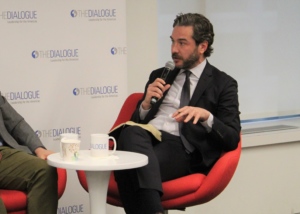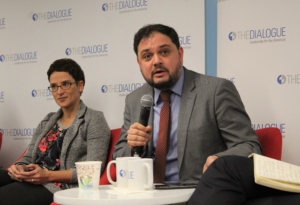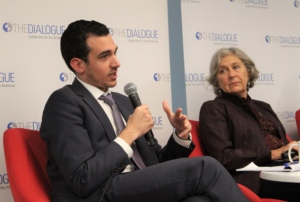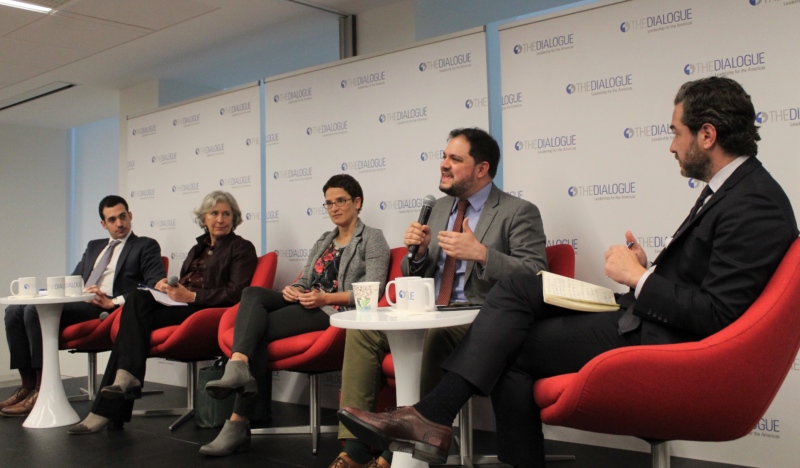The Nationalism of Cristina Fernández de Kirchner
Argentine President Cristina Fernández has increased her appeals to nationalist sentiment to build domestic political support.
On December 10, 2019, the Inter-American Dialogue, hosted an event titled “New Leadership in Argentina & Bolsonaro’s First Year.” President of the Inter-American Dialogue, Michael Shifter gave welcoming remarks in which he noted the significance of this event as it coincided with the new President of Argentina, Alberto Fernández, taking office, and proceeded Brazilian president Jair Bolsonaro’s anniversary of his first year in office on January 1. The panelists were Matias Spektor, Associate Professor of International Relations at Fundação Getúlio Vargas; Rut Diamint, Professor at University Torcuato Di Tella; Bruno Binetti, Non-Resident Fellow at the Inter-American Dialogue; and Monica de Bolle, Senior Fellow at the Peterson Institute for International Economics and Adjunct Lecturer at Johns Hopkins SAIS. Rafael Mathus, correspondent for La Nación, moderated the event.
[caption id="attachment_90654" align="alignleft" width="300"] Rafael Mathus[/caption]
Rafael Mathus[/caption]
Mathus began the discussion with Argentina and asked the panelists what they saw as Fernández’s biggest challenge as he takes office. Monica De Bolle stated that his main challenge would be Argentina’s debt. She mentioned Fernández’s own comments in his inauguration speech on this subject in which he said that Argentina really wants to pay its debt but has no capacity to do so. De Bolle believes this is a strong hint that 2020 will see an Argentine attempt to once again restructure the debt. She and Mathus then discussed the likelihood and the possible significance of an Argentine default.
Continuing the topic of Argentina, Rut Diamint then addressed the question of whether one ought to expect Fernández to govern moderately or to follow more closely in Cristina Fernández de Kirchner’s footsteps. Though Diamint noted it is impossible to know for certain what will happen, she said she has the feeling that Fernández will make serious attempts at governing more moderately, more along the lines of Néstor Kirchner than Cristina. Diamint continued by speculating the role that Cristina Fernández de Kirchner will play as vice president in the Fernández-Fernández administration.
[caption id="attachment_90648" align="alignright" width="300"] Monica de Bolle and Matias Spektor[/caption]
Monica de Bolle and Matias Spektor[/caption]
On the subject of Brazil, Matias Spektor noted that a year ago the questions about Bolsonaro were whether he could govern and was he a threat to democracy. Spektor stated that, a year later, his answer to both questions is yes. He noted the strength of Bolsonaro’s political messaging but was careful to remark that many of the advancements made, particularly pension reform, have been spearheaded by the Brazilian congress which has strong reformist ambitions. This sentiment was echoed throughout the discussion, particularly by De Bolle who also noted that Rodrigo Maia, the Speaker of the House in Brazil, was a key figure in pushing pension reform and continues to play a large leadership role in many pertinent areas of policy.
[caption id="attachment_90645" align="alignleft" width="300"] Bruno Binetti and Rut Diamint[/caption]
Bruno Binetti and Rut Diamint[/caption]
Another salient theme throughout the event was the importance of trade and economic considerations, particularly within the context of MERCOSUR. When asked about the current state and the future of MERCOSUR, Bruno Binetti noted that for both Argentina and Brazil it is a partnership of necessity. Binetti stated that their industries are not globally competitive and said if Brazil and Argentina don’t sell to each other, they simply won’t sell to anyone, sparking laughter from the audience. Though there was general agreement that MERCOSUR is unlikely to rupture in the near future, the panelists differed in their levels of optimism for future Argentine-Brazilian relations.
Finally, the panelists discussed the role of China and the United States. They discussed the effects of the US-China trade war and speculated about what rising competition between China and the United States in the region would mean for Argentina and Brazil, particularly regarding international financing and investment. Spektor remarked “It’s going to be a hard time for Brazil and for Argentina because when the system is polarized, not picking sides is virtually impossible unless you have a lot of leverage, which as De Bolle said correctly, we [Argentina and Brazil] don’t.”
During the Q&A portion of the program, questions from the audience touched upon the importance of the World Trade Organization, potential options for Brazilian economic growth, and the role of social media in Bolivian politics.
Argentine President Cristina Fernández has increased her appeals to nationalist sentiment to build domestic political support.
How will the Fernández administration’s policies affect the country’s economy and businesses in the long-run?
Given today’s realities, the glowing terms some used to describe US-Argentine relations in the 1990s do not make sense. But neither does the excessively negative talk heard in Buenos Aires and Washington.
 Irene Estefanía González | Inter-American Dialogue
Irene Estefanía González | Inter-American Dialogue